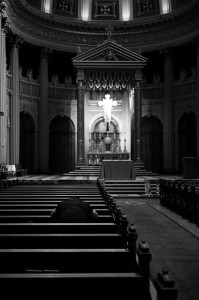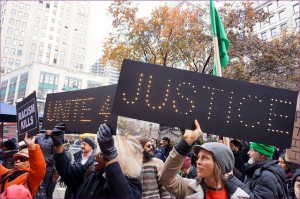This is the third post in a conversation between me and Eve Tushnet. You can read the first post about what we like about Catholicism here, and the second post about what we don’t love here.

Many of you may know Eve Tushnet from her blog here on Patheos, where she writes about being gay, celibate, and Catholic (along with World Figure Skating Championship costumes and other events of note). Eve grew up “somewhere between agnostic and Jewish” and

converted to Catholicism when she was a sophomore in college.
I did the inverse: I was raised firmly Catholic and started drifting away from “the Church” in college, when I just couldn’t stomach my church’s position on women priests and gay marriage, among other things, and eventually ended up at a social-justice-oriented spiritual community.
I thought it would be fun to talk about why, despite our seemingly large hurdles (background, political beliefs, sexuality), we still really like the Catholic Church. (Even though my new church is Methodist, I still say that I was “raised Catholic.”)
Today, we’re talking about what makes a Catholic a Catholic.
Alicia: What do you think it means to be Catholic? Your Catholicism seems much more intellectual than mine ever was, and I considered myself a fairly committed Catholic. Does Catholicism require us to understand some/most of it? Or is it enough to go through the sacraments and say that you believe in the Nicene Creed (even if you don’t think about it all that hard)?
Eve: I don’t really think I have much of a definition of what it means to be a Catholic, other than “baptized in the Catholic Church.” The definition from Monty Python’s “Every Sperm Is Sacred” has a lot of wisdom in it (as does that sketch in general, lol):
You don’t have to be a six-footer,You don’t have to have a big brain.You don’t have to have any clothes on;You’re a Catholic the moment Dad came.

doesn’t accept it all or can’t live it out. There’s a powerful witness in that person’s perseverance, her willingness to wrestle angels from within the Church. We hear about people who went decades without receiving Communion, because their beliefs or their life situations were not in harmony with the Catholic way of life. That’s tragic on one level, and intensely painful for the people involved. But their decades of kneeling in prayer while everyone else goes up to receive are also decades of witness and humility. (I wrote a bit more about that here.)

up to. My progressive church would say “No way!” but I think we would say that you have to care about certain things to be a part of our church, and to some degree, you have to act on them. You have to at least want to be part of the solution to say, institutionalized racism. But–both in my church and the Catholic church–there’s an acknowledgment that we all fail constantly and deserve to be welcomed back. We all deserve mercy, forgiveness, and understanding, from ourselves and from others.












